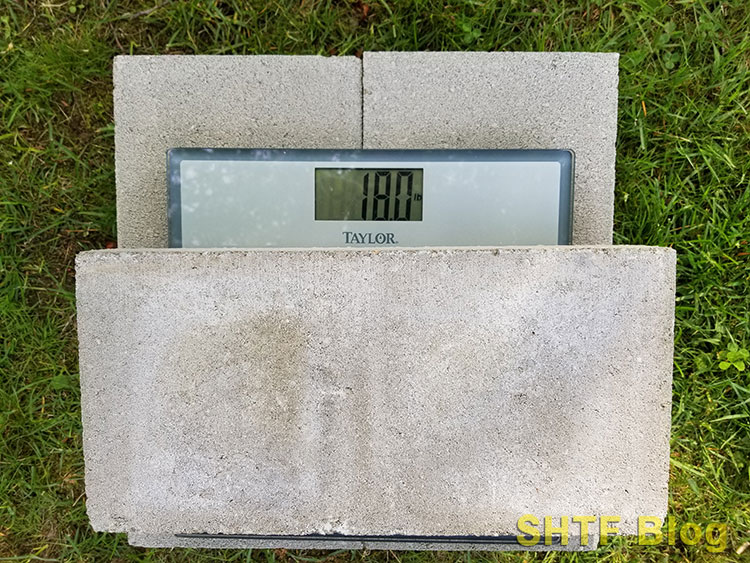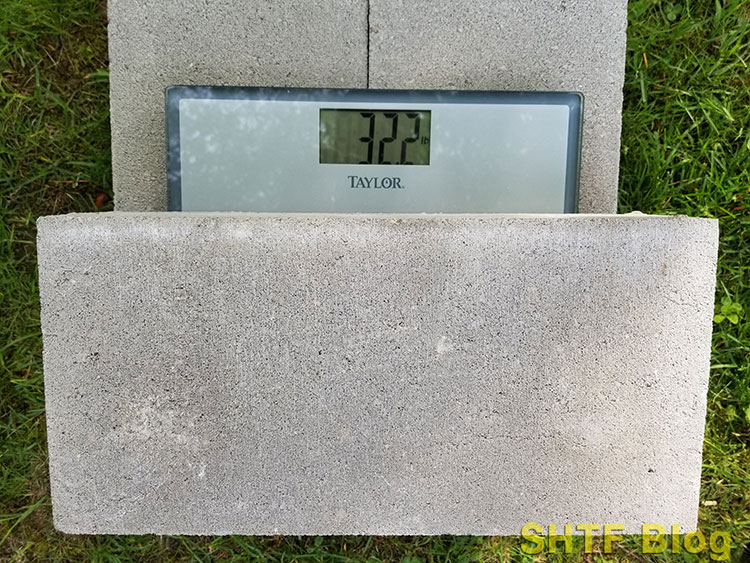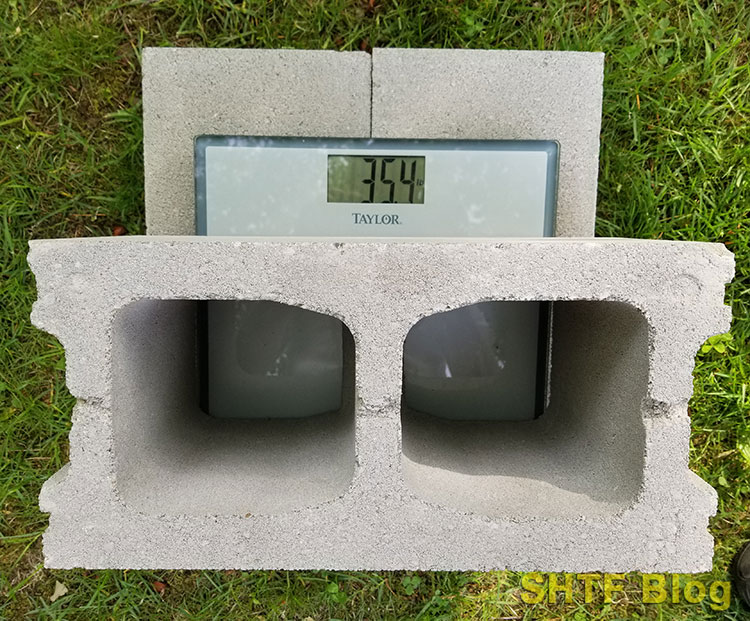
Concrete blocks are an exceptionally common building material used for many different homesteading projects, from building construction to making concrete block raised beds for gardening. Their weight can make them challenging to work with, however. Will floors support them? How many can your truck carry?
In another article I examined the average weight of different bricks. We’re going to do the same thing only looking at the average weight of different concrete blocks.
Average Concrete Block Weights for 3 Common Blocks
Concrete blocks began to be used in earnest with the advancements in block machinery around the turn of the 20th century. Establishment of the Portland cement industry, innovations in production, and marketing of concrete at the 1904 St. Louis Purchase Exposition all contributed to their rise in use (source).
We have to use the word “average” here, because you are not going to find a precise, consistent weight for all concrete blocks, even when they are in the same dimensions. Lowe’s or Home Depot may list weights that are different from stores specializing in masonry products. This could be because of the quantity of materials going into the production, natural deviations in density, different end styles, etc. Despite masonry standards, differences exist.
For example, I bought the 8 x 8 x 16 block pictured above at Home Depot. Online they list the block as weighing 38 pounds, but when I put one on the scale, it weighed in at 35.4 pounds, a 2.6 pound difference. Regardless, for general knowledge, we can use the average weights for any building project calculations.
Builders will often use a more diverse array of concrete blocks, but for the average homeowner, do-it-yourselfer, and homesteader, there are three common blocks: 8″ x 2″ x 16″; 8″ x 4″ x 16″; and the most common, 8″ x 8″ x 16″ hollow block.
8 x 2 x 16
This smaller, flatter block can be used for a variety of purposes, decorative and functional. My intent was to use them for both, add 2 more inches to the wall of my fire pit and as a decorative capstone to cover the open-holed concrete blocks underneath.
The standard 8 x 2 x 16 concrete block weighs 16 pounds on average (7.26 kg). I put one on the scale and it came in at an even 18 pounds.

8 x 4 x 16
The 8″ x 4″ x 16″ block is halfway between the 8 x 2 x 16 and the block that follows. It’s a solid block. It’s rectangular and heavy. Because of their dense, compact size they’re not as easily moved around as the other two common blocks listed here. They’re not as easily slid around as the 8 x 2 and lack the angles for easier lifting that a larger block has.
The standard 8 x 4 x 16 concrete block weighs 33 pounds on average (15 kg). I put one on the scale and it came in at 32.2 pounds.

8 x 8 x 16
Say “concrete block” and people will most likely assume you mean the standard 8″ x 8″x 16″ concrete block, the kind with two holes used for many building projects. The holes allow space to run materials or rebar, to fill with various matter, and general just cut the amount of concrete used and the weight of the block.
The standard 8 x 8 x 16 concrete block weighs around 38 pounds on average (15.88-17.24 kg). That’s how you’ll see them typically listed. I put one on the scale and it came in at 35.4 pounds (16.05kg).

Complete List of Weights
Those 3 most common concrete blocks by no means represent all of the available blocks available on today’s market. Even for my concrete block cook station I had to buy a few 8″ x 8″ x 8″ square blocks. I could not find these at the big box stores or my local hardware store. I had to go to a landscaping business where they specialize in concrete and stone products.
The options at that store were much better, so if you have a concrete block project in mind (more on that in a minute), it may make sense to go to a store specializing in concrete products. Odds are high you will get a better price and that they will have delivery options, saving you time, money, and potentially wear and tear on your vehicle.
| Concrete Block Size | Average Weight |
|---|---|
| 2″ x 4″ x 8″ brick (solid) | 5 pounds (2.27 kg) |
| 8″ x 8″ x 8″ (hollow half block) | 23 pounds (10.43 kg) |
| 2″ x 8″ x 16″ (solid) | 16 pounds (7.26 kg) |
| 4″ x 8″ x 16″ (hollow) | 24 pounds (10.89 kg) |
| 4″ x 8″ x 16″ (solid) | 33 pounds (15 kg) |
| 6″ x 8″ x 16″ (hollow) | 30 pounds (13.6 kg) |
| 6″ x 8″ x 16″ (solid) | 56 pounds (25.4 kg) |
| 8″ x 8″ x 16″ (hollow) | 38 pounds (17.24 kg) |
| 8″ x 8″ x 16″ (60% solid) | 47 pounds (21.32 kg) |
| 8″ x 8″ x 16″ (solid) | 54.125 pounds (24.55 kg) |
| 10″ x 8″ x 16″ (hollow) | 46 pounds (20.87 kg) |
| 12″ x 8″ x 8″ (hollow) | 31 pounds (14.06 kg) |
| 12″ x 8″ x 16″ (hollow) | 58 pounds (26.3 kg) |
You could find so many options out there that the complete list below may never actually be “complete.” New blocks keep getting brought to market. So, if you find a block not listed here, leave a comment on the article and we’ll add it to the list.
Concrete Block Projects
Despite their heavy weights, concrete blocks are the perfect building “block” for home projects. Their low cost, convenient sizing, and ready availability make them a valuable resource around the homestead on par with lumber. You can use them for a fire pit, as I did, raised beds, and general construction.
Many preppers also know their use in constructing rocket stoves for emergency, off-grid cooking:
Further Reading
Ready to take your concrete blocks and put them to use? Consider the following books:
- Black & Decker The Complete Guide to Concrete & Masonry – by Editors of Cool Springs Press
- Building with Masonry: Brick, Block & Concrete / For Pros by Pros – by Richard Kreh
- Cinder Block Gardens – by Lynn Gillespie
- The Complete Guide to Home Masonry: Step-by-Step Projects & Repairs Using Concrete, Brick, Block & Stone – by Editors of Creative Publishing
If you’re here reading this article, tell us what you’re planning to use concrete blocks for in the comments section below!

